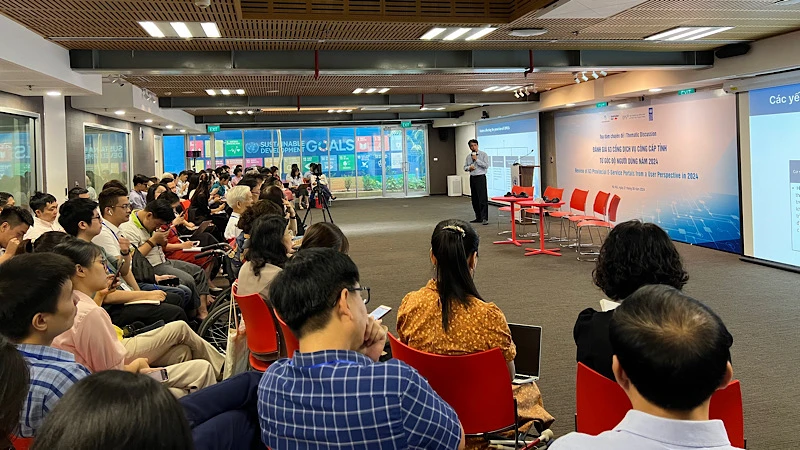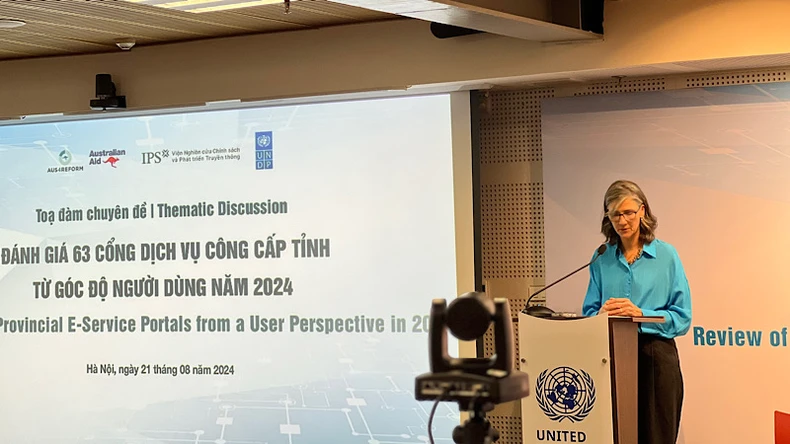
This is the second year that the Institute for Policy Research and Media Development (IPS) has conducted this evaluation study. The purpose of the research is to understand the challenges users face when utilizing Public Service Portals and online public services, thereby proposing solutions to help central and local government agencies enhance the user-friendliness of public service portals and improve the effectiveness of online public service delivery.
The evaluation results of the 63 public service portals in 2024 indicate that localities have made some improvements in providing online public services compared to the 2023 review.
There are improvements, but much work remains...
Many public service portals have achieved a 'good' rating in the two criteria of "Providing Support Information" and "Ease of Use of Search Tools." However, all 63 public service portals still have aspects that are inconvenient for users, whether they are civil servants or citizens, especially for those in remote areas, islands, and people with disabilities. All provinces and cities need to invest in improving public service portals in various aspects to increase convenience, friendliness, and accessibility, meeting the needs of all users.
Speaking at the seminar, Nguyen Minh Hong, President of the Vietnam Digital Communication Association (VDCA), pointed out that in the context of the rapidly developing digital government, online public service portals play a key role in connecting the state with citizens and businesses. Despite many improvements since 2021, the rate of online applications has not yet met expectations, and the quality of services remains limited.
Mr. Hong emphasized, “Evaluating public service portals from the user’s perspective is extremely important to ensure that digital transformation meets the needs and expectations of the people.”
According to the evaluation results, overall, the public service portals do not meet user needs and have not achieved the ultimate goal of facilitating administrative procedures. Many users of the Public Service Portal still cannot complete procedures independently and must rely on direct guidance or assistance from civil servants.
However, these issues are only the surface of the challenges in providing online public services. One of the root causes of the current shortcomings and difficulties is that administrative processes and procedures are still complex and not fully digitized.
Moreover, online public services are still being uploaded to the Public Service Portal based on paper and direct processes, rather than through a digitized and indirect method.
Additionally, the technical infrastructure in many localities does not meet requirements, the capabilities of officials and civil servants are uneven, and the support measures for citizens are ineffective, posing significant challenges to the widespread implementation of online public services.
Transforming Mindsets Towards Digital Governance
Ramla Khalidi, UNDP Resident Representative, stated, “Compared to the results of the 2023 review, many localities have upgraded public service portals to ensure access to online public services for people with disabilities. However, as this study indicates, further improvements are needed to ensure online public services are convenient, user-friendly, and accessible to everyone. The evaluation results also contain valuable implications for enhancing access conditions and the usefulness of public service portals for all citizens, especially those groups who are often left behind in the digital transformation process.”

According to Ms. Khalidi, local governments will find the proposals in the report useful and feasible. Once citizens and communities in remote areas have access to public administrative services, Vietnam's administration will become more inclusive.
One part of the reason for the shortcomings of public service portals is the lack of synchronization between provincial public service portals and the National Public Service Portal, making it difficult for users to adapt to different interfaces when using online public services.
Additionally, the administrative procedure resolution processes are not fully publicized, not presented in a clear and understandable way, and users cannot track the progress of their applications on the Public Service Portal, making it hard for them to grasp the steps required to use online public services and monitor application progress.
To enhance the effectiveness of public service portals and improve the delivery of online public services, the research report has made recommendations ranging from specific improvements to mindset changes in the digital environment, placing users at the center.
Firstly, provinces and cities need to review and address technical errors on the Public Service Portal to ensure effectiveness, substantiality, and transparency in information to enhance convenience, accessibility, and user-friendliness, especially for ethnic minority groups, the elderly, and people with disabilities.
Improving the capacity of officials and civil servants in deploying and providing online public services must be prioritized, alongside raising public awareness about the convenience of the Public Service Portal and online public services.
According to the research report, the most crucial necessity is to transform mindsets regarding the digital environment, focusing on developing policies and implementing online public services from the perspective of “digital governance,” emphasizing natural interaction in the digital environment between service providers and users of online public services.
The application of digital technology and data connectivity must be carried out flexibly to remove administrative barriers while ensuring effective data sharing and connection. Legal documents related to administrative processes and procedures need to be amended to better fit the digital environment. Implementing administrative procedures not bound by administrative boundaries should also be emphasized. Looking ahead to 2030, it is essential to establish a national focal point for providing online public services through a unified public service portal.
According to Nhan Dan Newspaper.
(This translation was provided by an automated AI translation tool)

.jpg)


